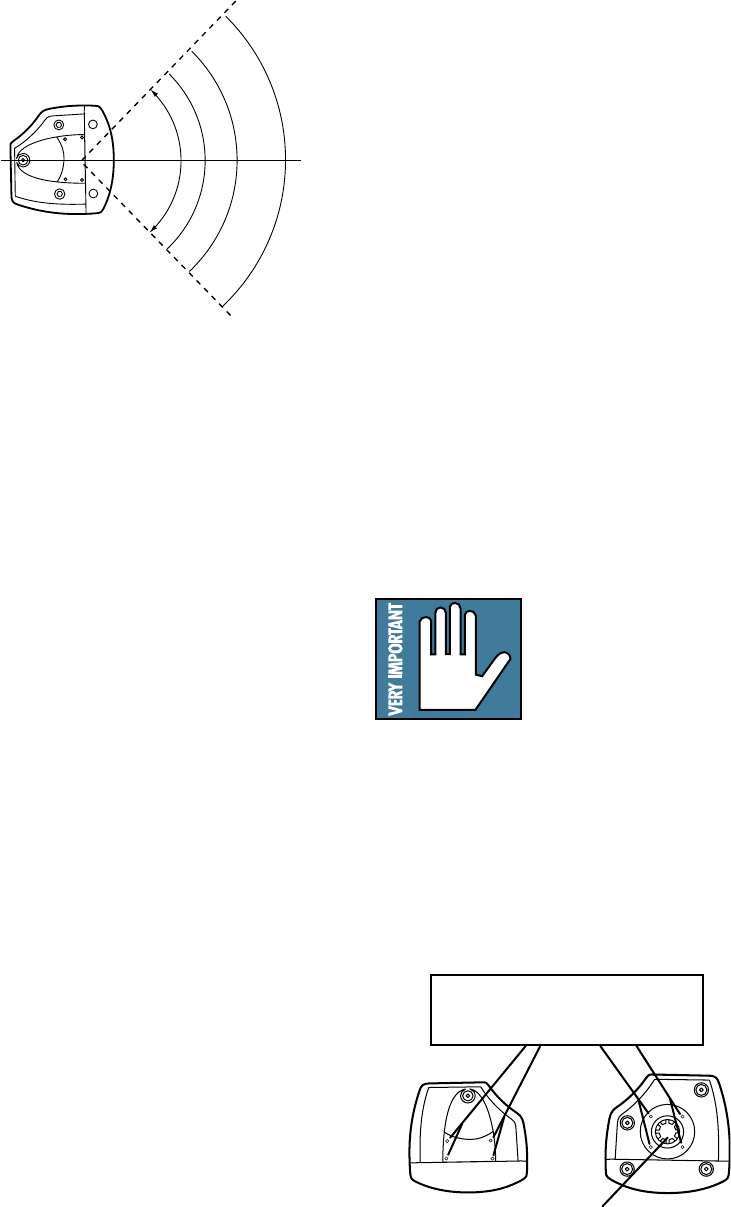
7
Room Acoustics
The C200 loudspeakers are designed
to sound as neutral as possible; that is, to
reproduce the input signal as accurately as
possible, monitoring the audio signal rather
than changing it.
Room acoustics play a crucial role in
the overall performance of a sound system.
However, the wide high-frequency dispersion
of the C200 helps to minimize the problems
that typically arise.
Top
90
0
Dispersion
up to 20 kHz
90
0
Here are some other placement tips:
• Avoid placing loudspeakers in the
corners of a room. This increases the
low frequency output and can cause the
sound to be muddy and indistinct.
• Avoid placing loudspeakers against a
wall. This, too, increases the low fre-
quency output, though not as much as
corner placement. However, if you do
need to reinforce the low frequencies,
this is a good way to do it.
• Avoid placing the speakers directly on
a hollow stage floor. A hollow stage can
resonate at certain frequencies, caus-
ing peaks and dips in the frequency
response of the room. It’s better to place
the loudspeakers on a sturdy table or
tripod stands.
• Position the loudspeakers so the high-
frequency drivers are 2 to 4 feet above
ear level for the audience (make allow-
ances for a standing/dancing in the
aisles audience). High frequencies are
highly directional and tend to be absorbed
much easier than lower frequencies.
By providing direct line-of-sight from
the loudspeakers to the audience, you
increase the overall brightness and intel-
ligibility of the sound system.
• Highly reverberant rooms, like many
gymnasiums and auditoriums, are a
nightmare for sound system intelligi-
bility. Multiple reflections off the hard
walls, ceiling, and floor play havoc with
the sound. Depending on the situation,
you may be able to take some steps to
minimize the reflections, such as putting
carpeting on the floors, closing draperies
to cover large glass windows, or hanging
tapestries or other materials on the walls
to absorb some of the sound.
However, in most cases, these remedies
are not possible or practical. So what
do you do? Making the sound system
louder generally doesn’t work because
the reflections become louder, too. The
best approach is to provide as much
direct sound coverage to the audience as
possible. The farther away you are from
the speaker, the more prominent will be
the reflected sound.
Use more speakers strategically placed
so they are closer to the back of the
audience. If the distance between the
front and back speakers is more than
about 100 feet, you should use a delay
processor to time-align the sound. (Since
sound travels about 1 foot per millisec-
ond, it takes about 1/10 of a second to
travel 100 feet.)
RIGGING
The C200 cabinets are fitted with four
M5 insert points on the top and bottom for
installing an optional accessory plate that al-
lows the speaker to be flown.
WARNING: Never at-
tempt to suspend the
C200 loudspeakers by
their handles. If you want
to suspend them, use
the accessory plate only.
Consult a professional rigger or structural
engineer prior to suspending loudspeakers
from a structure not intended for that use.
Always know the working load limit of the
structure supporting the loudspeaker array.
Always make sure that the rigging hard-
ware minimum rating is at least five times
the actual load.
M5 inserts for mounting
rigging accessory plate
Bottom
Pole
Mount
Top














